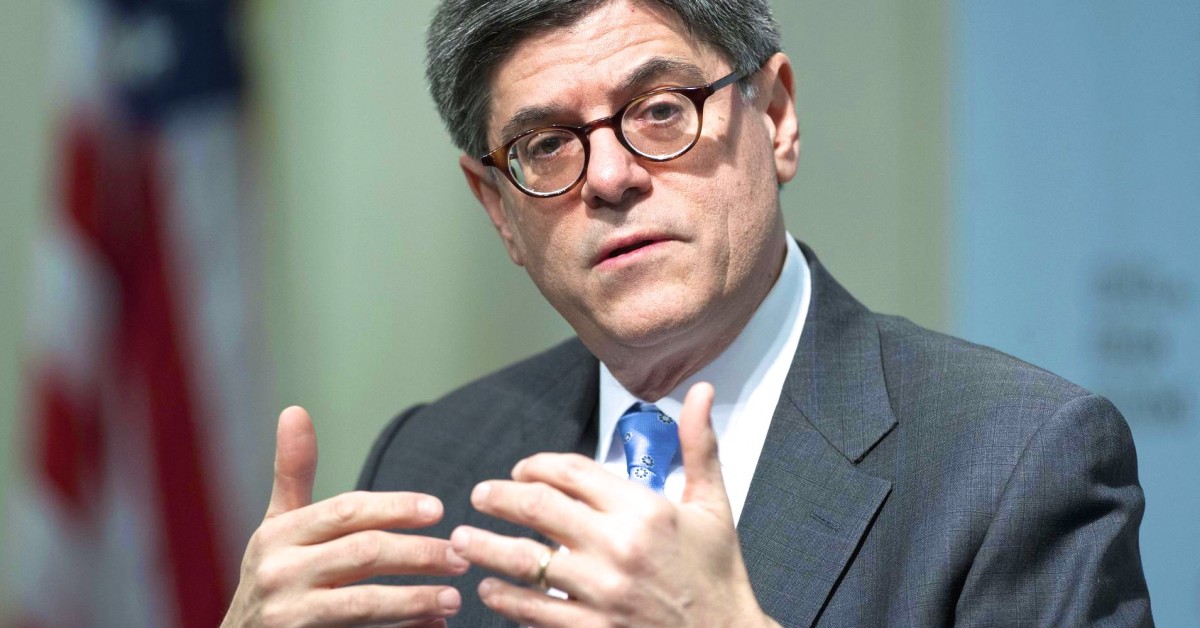
Jacob Joseph ("Jack") Lew is one of the two most powerful financial diplomats in the world, the other being his central banking counterpart, Janet Yellen, the Chair of the Federal Reserve Board. As the U.S. Secretary of the Treasury, Lew has been the most important economic official inside the Obama administration since his confirmation in February 2013 following the president's re-election.
Prior to serving as Treasury Secretary, Lew was White House Chief of Staff to President Obama from 2012 to 2013, and Director of the Office of Management and Budget from 2010 to 2012, a position he also held in the Clinton administration from 1998 until 2011. Lew was also Deputy Secretary of State under Hillary Clinton from 2009 to 2010. But from 2006 to 2008, he worked at Citigroup, overseeing the bank’s $1.8 billion in wealth management assets, and was then appointed as one of Citi's senior executives.
Lew’s appointment to Citigroup was made on the recommendation of the bank’s then-Chairman Robert Rubin, the former Treasury Secretary from the Clinton administration (1995-1999), with whom Lew worked closely. When Lew left the bank to join the Obama administration immediately following the 2008 financial crisis and the billions in bailouts his bank received, Lew got a bonus of almost $1 million from Citigroup on top of his more than $2 million in regular earnings from the bank.
Tracking Lew's Movements
In examining the role played by the Treasury Secretary to shape U.S. and global economy policy, it's revealing to look at his schedule over the course of a year. After reviewing Secretary Lew’s schedule of phone calls and meetings in 2014, it's easier to understand what it means to be one of the world’s most powerful financial diplomats. More than any other high-level official, Lew was in consistent contact with Yellen, having held over 30 phone calls or meetings with the Federal Reserve Chairperson over the course of the year, which included regular lunch or breakfast meetings.
As the two top diplomats and managers of the American economy and the U.S. dollar, it makes sense for these two individuals to meet frequently, both to assess the economic outlook and to devise a common U.S. position at international meetings – like the bi-annual meetings of the IMF steering committee known as the International Monetary and Financial Committee (IMFC), as well as the secretive meetings of finance ministers and central bankers of the Group of Seven (G7) and Group of Twenty (G20) nations.
Officially founded in 1976, the G7 sits at the center of global economic governance, meeting at the head of state level once a year, and holding multiple meetings and conference calls among the finance ministers and central bank governors of nations that comprise its membership: the U.S., Germany, Japan, France, UK, Italy and Canada. The G20, on the other hand, was founded as a meeting of finance ministers and central bank governors in 1999, and only started meeting at the head of state level in late 2008 in the midst of the global financial crisis.
Jack Lew was in frequent contact with his G7 peers, including all of the finance ministers and most of the central bankers. In addition to the gatherings of the G7 and G20, Lew spoke or met with German Finance Minister Wolfgang Schauble roughly 20 times throughout 2014. In the same period he met or spoke with the British Chancellor of the Exchequer, George Osborne, roughly 16 times; with European Central Bank (ECB) President Mario Draghi some 15 times; and with Japanese Finance Minister Taro Aso 14 times.
Secretary Lew also had extensive contact with French Finance Minister Michel Sapin and his predecessor Pierre Moscovici, who became European Commissioner for Economic and Monetary Affairs; Italian Finance Minister Pier Carlo Padoan; Canadian Finance Minister Joe Oliver; and Mark Carney, the Governor of the Bank of England and Chairman of the Financial Stability Board (FSB), an institution that brings together central bankers, finance ministers and regulators to oversee the global management of financial markets. Lew spoke or met with Carney some 12 times throughout the year.
But apart from Yellen, the high-level official with whom Lew had the most contact was Christine Lagarde, the Managing Director of the IMF and a former French Finance Minister; Lew met or spoke to Lagarde roughly 23 times in 2014, including at the meetings of the G7 and G20, which the IMF Managing Director typically attends.
The G20 has a much wider membership than the G7, though it includes all of the G7 nations in addition to Australia, the European Union, and major emerging market economies such as China, India, Brazil, Russia, Mexico, Turkey, South Africa, Saudi Arabia, Argentina, Indonesia and South Korea. The heads of major international organizations like the IMF, World Bank, Bank for International Settlements (BIS), World Trade Organization (WTO), and the Organization for Economic Cooperation and Development (OECD) also typically attend the meetings of the G7 and G20.
Following Yellen, Lagarde and Schauble, Secretary Lew was most frequently in contact with Australian Treasurer Joe Hockey, with whom he met or spoke roughly 17 times throughout the year. While Australia is not even a member of the G7, it would typically seem odd to have such extensive communication between its Treasurer and the U.S. Treasury Secretary. But Australia was hosting the G20 meetings in 2014, and thus Hockey closely coordinated with Lew on meetings that involved financial officials convening four times during the year.
Another name that stands out is Tharman Shanmugaratnam, the Singaporean Finance Minister who held nine separate calls and meetings with Lew, and 13 including those of the G20. Shanmugaratnam became Finance Minister of Singapore, a wealthy Asian city-state, in 2007, and has also held the dual role as head of the Monetary Authority of Singapore (MAS), the country’s central bank. In addition, Tharman serves on the board of directors of Singapore’s large sovereign wealth fund, GIC, which manages between $100 and $350 billion in assets, including significant stakes in Citigroup and UBS, Switzerland’s largest bank.
The likely reason why Lew had such frequent contact with Shanmugaratnam – the chief financial diplomat of a country that is neither a member of the G7 nor the G20 – is because in March of 2011, Shanmugaratnam was appointed Chairman of the IMF’s steering group, the International Monetary and Financial Committee (IMFC), made up of finance ministers and central bank governors from the nations represented on the Fund’s Executive Board.
Lew attended the World Economic Forum in Davos, Switzerland, in January of 2014, where he held private bilateral meetings with Mark Carney of the Bank of England (and FSB), Saudi finance minister and central bank governor Ibrahim Al-Assaf, ECB President Mario Draghi, and Mexican Finance Minister Luis Videgaray, who was another emerging market diplomat with whom Lew had frequent contact throughout the year (eight separate phone calls and meetings, or 12 including those at the G20).
In February, Lew traveled to Australia for the first G20 meeting of finance ministers and central bank governors under the chairmanship of Australian Treasurer Joe Hockey. Lew moderated a session of a conference hosted by the Institute of International Finance (IIF) and held private meetings with German Finance Minister Schauble, Turkish Deputy Prime Minister and top financial diplomat Ali Babacan, and Japanese Finance Minister Taro Aso. And just before the official G20 meetings began, the G7 countries got together for a quiet one-hour meeting as well.
As the Spring Meetings of the IMF were starting in April, Jack Lew held private meetings with Russian Finance Minister Anton Siluanov, Videgaray of Mexico, Draghi of the ECB, Saudi Finance Minister Al-Assaf, and Brazilian Finance Minister Guido Mantega. Once again, Lew attended a private one-hour gathering of the G7 ministers before attending a wider G20 meeting of ministers and central bank governors on April 10. The following day, Lew attended the joint G20-IMFC meeting, and continued with G20 meetings for the rest of the day.
In September, Lew once again traveled to Australia for a special meeting of G20 financial diplomats, during which time Germany served as host for a private lunch meeting of the G7 finance ministers and central bank governors. He returned to Australia in November for the main head-of-state summit of the G20, where he privately met with his counterparts from Saudi Arabia, China, France, Japan, and with Mark Carney of the FSB.
As the chief financial diplomat from the most powerful nation and economy in the world, Jacob Lew is the central figure among G7 diplomats with whom he is in frequent contact, while closely coordinating with the chairs of the G20, the IMFC, and the heads of international organizations like the IMF and FSB. Through these and other groupings, Treasury Secretary Lew sits at what can only be understood as the absolute center of global financial diplomacy and governance.
3 WAYS TO SHOW YOUR SUPPORT
- Log in to post comments
















